Peter MALONE
Saturday, 18 September 2021 19:24
Go Into Your Dance
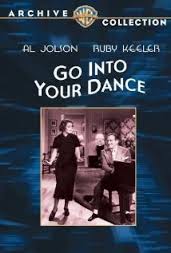
GO INTO YOUR DANCE
US, 1935, 92 minutes, Black and white.
Al Jolson, Ruby Keeler, Glenda Farrell, Helen Morgan, Barton Mac Lane.
Directed by Archie Mayo.
One of the many Warner Brothers musicals of the early and mid-thirties. However, it was not directed by Busby Berkeley, but by Bobby Connelly (who has a number of the famous Berkeley touches).
The film is of interest as a star vehicle for Al Jolson, who had made his impact in sound films with The Jazz Singer and who had appeared in such musicals at Warner Bros. as The Odd Ball, Wunderbar. However, here he is teamed with his then wife, the very popular Warner Bros. dancer Ruby Keeler (42nd Street, Dames, Flirtation Walk). The make an unusual team. There are good supporting performances by the famous Helen Morgan as a singer, Patsy Kelly with a touch of comedy and Glenda Farrell as Jolson's tough sister.
The film has a number of pleasing musical sequences, especially Quarter to-Nine and Latin from Manhattan. Jolson has the opportunity to offer echoes of the songs for which he was famous and appears a number of times in Black Face - especially in the melodramatic final sequences. While the plot is the usual show biz story line of failure and success, a sub-plot is introduced about the kidnapping of the hero's sister with violent shooting at the end. Ruby Keeler, angelically dieing, is the victim.
Not a memorable musical, but significant in the history of the American musical film.
1. An entertaining musical? comedy? melodrama? the tradition of the Warner Bros, musicals?
2. Black and White photography, atmosphere of California, Chicago, Broadway, the nightclubs of the 30's, the lavish stage productions, the atmosphere of the 30's, the choreography - with the Berkeley touch?
3. The songs and there importance: the staging of a Quarter-to- Nine with its life and verve, the spectacle of Latin from Manhattan, the pathos of the finale with the title song ? the Jolson image and the songs from the South, his quoting his famous songs and famous lines, the dancing -choreography, Ruby Keeler's style, Helen Morgan and her contribution ?
4. The portrait of Al Howard - the irresponsibility, the hostility of the Broadway producers, the concern of Molly, finding him at the races in Mexico, his drinking, opting out, his Mexican song and dance ? the possibility of going in to team work ? the friendship with Dorothy after she rescues him at the stage door, the success of their act, his ignoring her, his concern for his sister, the plans for the singer to go in to the show ? the kidnapping of Molly ? melodramatics ? the final shooting ? his realisation of his love for Dorothy ? the Al Jolson personae and style ?
5. Ruby Keeler's simple style as Dorothy - in her original dance routines, the contrast with the. more fashionable dancers ? being seeing as "Kid" ? friendship with Molly, saving Al in the street, joining him in the dance routines, wanting to leave because he didn't notice her, the opening of the restaurant/club, the dangers for Molly, her giving her life for Al ? the sweet 30's heroine - giving herself for her man ?
6. Molly and her tough style with the producers, with Al, her plans, friendship with Dorothy, kidnap ? the other women and their contribution Helen Morgan and her associates, singing style ? the comedienne trying to do a song and dance act ?
7. Broadway producers, entrepreneurs, the risks taken, the hard lines, success ?
8. The background of show business in the 30's - and the other side of the depression ? the popularity of this kind of film in its time ? of historical interest ?
Published in Movie Reviews
Published in
Movie Reviews
Tagged under
Saturday, 18 September 2021 19:24
Going Up of David Lev, The
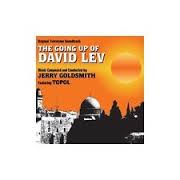
THE GOING UP OF DAVID LEV
US, 1973, 74 minutes, Colour.
Topol, Claire Bloom, Melvyn Douglas, Brandon Cruz.
Directed by James F. Collier.
The Going Up Of David Lev is an Israeli- American co-production. It was released at the time of the 25th. anniversary of the establishing of the state of Israel. It captures the atmosphere of modern Israel but presents it with an emotional story: family, young boy seeking his father, echoes of the six-day war. Topol, Israel's most popular international actor, has a comic singing role (he reminds us of his Fiddler on the Roof). An international cast headed
by Melvyn Douglas and Claire Bloom gives strength to the telemovie. The story is slight in itself but the impact comes from the Israeli background and the sense of patriotism and nationhood being communicated throughout the story. The Israeli locations are attractive.
1. The quality of the film as telemovie, American- Israeli co-production? The purpose, impact, entertainment value? Morale for Israel? The jubilee of 1973?
2. The impact of the telemovie: for home audiences. home watching, response to Israel as a nation, the background of Israel, the six-day war? Characters and situations? The universal appeal of the story?
3. The patriotic tone, the interest value of the plot, the sentiment and treatment of the characters and issues?
4. Audience response to Israel and its origins, persecution? 1973? The atmosphere of Tel Aviv, the road to Jerusalem, Jerusalem? The vistas of Israel? The significance of the state of Israel? The focus on David: as a young boy, the future of Israel, its hopes? The family background, his mother and grandfather? Leaving Tel Aviv ? The taxi-ride and the encounter with the taxi-man? The significance of going up to Jerusalem? His experiences on the way, friendship and song? His revelation of himself? The cab-driver's story? The significance of David's search for his father? The six-day war, heroism? The taxi-driver and his affection, guidance, rescuing from the police? The further meeting with him? The effect of his story on David?
5. The taxi-driver: Topol and his boisterous and humorous style, his songs? The humour of the taxi-driver? The difficulties with the car, the journey, the police, finding the right offices, their being shut? Persuasion? The story for David and the background of his father's death? The truth and
the legend? An Israeli hero?
6. The contrast with David's mother - American background, illness, hospital sequences, her relationship with her son?
7. The grandfather and his concern, work, the factory, relationship with David, with David's mother? The search for David?
8. David and the experience in Jerusalem: the encounters with the police, with the various people,, the offices, the discovery of records? The other children and clashes in Jerusalem? Adult help?
9. The quality of the film as a story about a family.. the background of war? Insight into character and yearnings? The importance of the absent father?
10. The film as an appropriate telemovie for the Israeli jubilee?
Published in Movie Reviews
Published in
Movie Reviews
Tagged under
Saturday, 18 September 2021 19:24
Going in Style
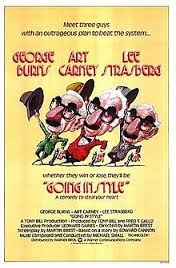
GOING IN STYLE
US, 1979, 94 minutes, Colour.
George Burns, Art Carney, Lee Strasberg.
Directed by Martin Brest.
The style of its three leads is what this slight comedy has going for it. They make quite flimsy material - old men sitting daily in a park plan the simplest bank robbery and do it - quite humorously. If only they had robbed another bank instead of going to Las Vegas and relying on gambling and luck comedy. Still, there are some good laughs and engaging performances by George Burns, still with excellent comic timing in his mid-eighties, Art Carney with his verve and drama teacher Lee Strasberg with his forlorn expressions. Some points are made about care of the aged, but this is a vehicle for its three stars.
1. An entertaining comedy? The qualities of humour, parody? A vehicle for its stars and their styles? A robbery film, gambling success film? The quality of the production and its entertainment value?
2. The performances of the stars - their particular comic styles, their blending? The title and its reference to them? To old age and dying - with wealth?
3. How well did the film treat thews of old age, the meaning of life, the enjoyment of life, death?
4. The establishing of the three old men - their sitting in the park, desultory conversations, the kiddies and their reactions to them, their being bored? Their routines, walking home, life at home, conversation, memories, meals, getting up during the night, sleepless nights, their lining up for Social Security cheques? How well did the film communicate this boredom of routine and the plight of the aged?
5. The humour of the idea for the robbery - lining up in queues for the cheques, seeing all the money? The presentation of the idea, the various reactions? The discussions, the comedy sequences of the buying of the masks, the choosing of the bank, A1 getting the guns and the testing out of the bullets? The robbery itself with its comedy routines and parody of so many robbery films of the '70s? The ease in getting away - the taxi and the elaborate plan, the subway and the train?
6. How well did the film delineate each character and allow the comedian star to communicate his style? George Burns and his presence, comic timing, the telling of his story, his memories? His surviving the other two? His being the leader? Art Carney and his comic verve, song and dance routines - the dancing with the group on the city streets, his way with the kids, his friendship with his nephew and his wife? The visits, the grief at his death? Lee Strasberg and his serious appearance - his being alone, slow, his rather sad expressions? His fears about the robbery? His participation and ultimately enjoying it? His death after enjoying it?
7. The focus on funerals and the reaction to death?
8. The decision to go to Las Vegas - the humour about travelling in planes, the long gambling sequences and their tone, the return and Al's lying down and dying? Going in style?
9. George Burns and his giving the money to Pete? The various conversations with Pete - Al's and his explanation of the loan, George Burns and the final benefit?
10. The arrest (and its lack of explanation), the interrogation and George Burns' defiance? The plan to go to prison and be supported, Pete's visit and the genial ending?
11. The quality of the comedy - its comment on issues, its using of popular genres with a twist with the old stars?
Published in Movie Reviews
Published in
Movie Reviews
Tagged under
Saturday, 18 September 2021 19:24
Going Home
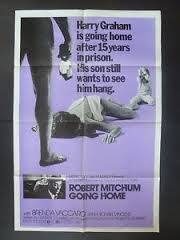
GOING HOME
US, 1971, 97 minutes, Colour.
Robert Mitchum, Brenda Vaccaro, Jan- Michael Vincent, Sally Kirkland, Josh Mostel, George di Cenzo.
Directed by Herbert B. Leonard.
Going Home is a striking but underrated film of the early 1970s. Produced at a time when M.G.M. was in crisis, it was cut and re-edited for final release to the disclaimers of its producer-director. However, what remains is an impressive and engrossing melodrama. It can be seen as a Robert Mitchum vehicle and he gives a strong performance. He is matched by an early performance of Jan Michael Vincent as a moody teenager. Brenda Vaccaro also adds strength to the woman in love with Mitchum.
The film has sombre themes - a man murders his wife, his young son gives evidence which puts him in prison, they encounter one another when the son is 19 and the father released from prison. The son wants vengeance and as he attempts it he begins to understand his father. The film uses the atmosphere of Pennsylvania and New Jersey and the road, quite a number of songs in background (with some religious overtones), and some devices for flashbacks and imagination. It runs the risk of being pretentious, but on the whole succeeds with strong impact. Screenplay is by Lawrence Markus who was to write Richard Rush's striking drama The Stunt Man.
1. The focus of the title, its reference to the Grahams ' home, the place where the mother was killed? Jimmy and his needing to go home to exorcise his memories and forgive his father? Harry's going home to confront the past and to relate to his son? The physical home and the transformation? Home being truly where the heart is and Harry and Jimmy being able to make a new home?
2. The technical aspects of the film: colour photography, creation of atmosphere on the American road? Editing devices? Special effects for imagination and flashbacks? Jimmy watching the past and being part of it? The importance of the musical score, the range of songs and their lyrics? Commenting on the action?
3. The opening and the focus on Jimmy as a child, his eyes, at night, his watching, the child's vision of his mother's death? The voice-over with the lawyers in court and the focusing on God, telling the truth, lies? (The addition of the religious themes with the opening songs and the love of Jesus with the consequent segment with the bible-seller?) The fact of his mother's death, his experience of it, his bitterness towards his father? The quick outline of his life in institutions and foster families? His going to see his father in prison and the variety of imaginings of how his father would greet him? His fear, his twisting things against his father, love-hate, his being impotent to confront his father - culminating in the rape of Jenny? His return how? His scoffing at his father - and his father's retort that he was to grow to 20 from 19? Jan Michael Vincent's style - appearance, brooding manner? Contradictions - visiting his father in prison, going back to the Charles' and seeing the young boy fostered there, the encounter with the girls but watching for his father, the meeting with his father and Jenny - eating and then leaving, his watching Jenny at work, fighting the sailors to defend her and yet ultimately raping her? Working with his father and yet writing the hostile graffiti on the wall? Listening to his father and yet not listening? Communicating and being unwilling to communicate? A wounded young man, a wounding young man? A satisfying portrait of this kind of adolescent?
4. The more straightforward presentation of Harry: the initial killing, the condemnation? Harry as feared by Jiminy and as real? His work and skills, the friendship with Jenny, welcoming Jimmy, working with him in removing things and the discussion about sex? Relenting towards his son? Driving with him, talking with him? Ignoring the graffiti? Making a good impression on the parole officer (and Jimmy's hostile reaction to this)? His tenderness towards Jenny in the night? Fighting to save his son against the sailors? The preparation for marriage? His going to get his son and confront him in the home? The importance of the flashbacks and showing love for his wife and child, the bowling, the discussion about his Korean war wound, popularity with the neighbours, his sister and her bitterness and his believing her and killing his wife? His admission of his responsibility to Jenny? A man who committed a crime, served his sentence, had to build his life?
5. Audience sympathies towards Jimmy and then towards Harry? Questions of right and wrong, good and evil? Hopes? Who was the sinner and who sinned against?
6. The build-up to the confrontation between father and son? The father preparing for marriage? The son viciously raping for revenge - then the possibility of remorse? The visit to the home, phone call, Harry coming to his son? The confrontation of the past? The symbol of getting the car out of the crowded car park? The possibility for future reconciliation? An appropriate ending?
7. The portrait of Jenny - ordinary young woman, her being in the camper van park, the relationship with Harry, falling in love with him but wary of marriage, the initial encounter with Jimmy, the meal and the talk about the prize? Her care for Harry - and her being unable to sleep? Concern ed for Jimmy? At work and the confrontation with the sailors? Buying the plants and the talk with Jimmy - and the culmination in the rape? Her hard bitter tears after the rape? Her not telling Harry? The possibility of a future with Harry? A portrait of a lonely young woman? A realistic and sympathetic portrait?
8. The picture of institutions: prison, orphanages, the Charles' house, the parole officer and the room in which he questioned?
9. The range of people portrayed as background to the film: the people in the caravan park, the bowling alleys, the sailors, the man who ran the nursery, the people at the diners, the Italian and their celebration at the old house? The picture of the American roads, parks, people at play, eating? A cross-section of the world - aspirations, hopes, sorrows?
10. The flashback - the past happiness with the picnic, Harry and his wife, JIMMY? The killing and the effect on father and son? The cruelty of fate?
11. The screenplay and the patterns establishing father and son as parallel, as contrasting? The influence of one on the other? The lack of communication? The attempts at communication? Love-hate? Punishment? The contrast of their attitudes towards Jenny - marriage and cruelty? The possibility of hope after suffering?
12. An imaginative presentation of themes of love, hurt, hope, reconciliation and forgiveness?
Published in Movie Reviews
Published in
Movie Reviews
Tagged under
Saturday, 18 September 2021 19:23
Desperate Hours, The/ 1990
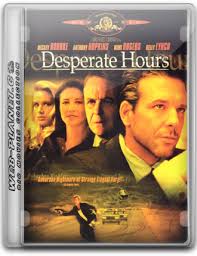
DESPERATE HOURS
US, 1990, 105 minutes, Colour.
Anthony Hopkins, Mickey Rourke, Mimi Rogers, Lindsay Crouse, David Morse, Kelly Lynch, Elias Koteas.
Directed by Michael Cimino.
Desperate Hours is an updated remake of the '50s thriller, from the novel and play by Joseph Hayes, with Humphrey Bogart and Fredric March. This film is directed by Michael Cimino (Thunderbolt and Lightfoot, Oscar-winner for The Deerhunter, reviled for Heaven's Gate, Year of the Dragon, The Sicilian). This remake is reminiscent of the remake of Cape Fear by Martin Scorsese (though made before it) with psychotic criminals holding a family to ransom in their home.
It is quite an entertaining thriller, moving rapidly enough so that the implausibilities are not noticed. It is strikingly photographed in a Utah autumn. The film also has a strong cast with Mickey Rourke alternating between charming menace and outbursts as the criminal and Anthony Hopkins and Mimi Rogers as husband and wife. Kelly Lynch is the crooked lawyer (but reformed enough for her next film as a lawyer, Curly Sue). Lindsay Crouse is a tough FBI agent. As with Cape Fear, American family life is more complicated than it appeared to be in the '50s, which gives the film more tension. However, the ultimate siege is quite extraordinary, where everyone lets fly with extraordinary amounts of gun power.
1. Interesting and entertaining thriller? The original and the remake? The updating to the '90s?
2. The beauty of the cinematography, the Utah state locations, the autumn? The musical score?
3. The title, expectations, the thriller genre, the siege - and its conventions?
4. The focus on the American family, the nuclear family of the '50s changing to the family breaking up in the '90s? The infidelity of the husband, the hurt for the wife, the young boy and his fear, the teenager and her self-assertion, her boyfriend?
5. The pace, the editing, Nancy and the car speeding at the start? The shift to the courtroom? Bosworth and his outbursts, Nancy and her defence? The reaction of the judge, going into private consultation - Nancy with the gun, the escape and hold-up? Nancy posing as the victim and in danger? Going to the car and leaving? The setting for the rest of the action?
6. Bosworth and his past? Brutality, legal aid in getting off charges, murder? Agent Chandler and her analysis of his motivation? The reaction of the police, her expectations of his behaviour? Tactical squads and the FBI? The interrogation of Nancy, the decision to let her go free and follow her? The planting of information on television news?
7. Bosworth and his brother Walter, the bond between them? Albert being the friend and companion of Walter? His treatment of them, the speeding away, letting Walter drive the car into the lake? Getting Albert to whistle? Their choice of the house? Bosworth and his charm in infiltration, Nora's reaction? Holding her and control? Tim and his arrival, Bosworth humiliating him, calling him Timmy? The blend of suave charm and violent outbursts? Reading the letters about the marriage, knowing about the children? The children coming home and being part of the siege? His dressing for dinner, the elegance of the meal - and his reaction, Walter and Albert awkward? The repairman, Nora writing the cheque with the note, his violent reaction towards her? His promising to keep his word? The interaction with the whole family? Tim and the money, going to the bank? The arrival of the estate agent and his brutally murdering him? Waiting for Nancy's phone call, nerves?
8. Walter and Albert and the bond between them, erratic, violent? Driving the car into the lake, Albert not wanting to be confined, finding Nora's gun? Interaction with May? Nerves, the clash with Tim, the knife and the wounding? Bosworth letting Albert go, taking the body, his driving, impatience on the road, getting rid of the body, covered in blood, finding the girls and frightening them, the police pursuing him, in the canyon - and whistling `The Red River Valley'? Not dropping the gun, raising it, being shot? Walter, the bewilderment, trying to do the right thing, softer than his brother? The bond with Albert? His being shot in the siege?
9. Tim and Nora and their marriage, the broken relationship, the selling of the house, Tim's affair with Karen, half his age, breaking it off? The early visit and the clash, the tension with his children? Nora at home, the difficulty with the heat, the phone call? Letting Bosworth in, reaction and fear, phoning Nancy as asked? Her concern about her children? Cooking the meal? The cheque and the message? The clash with Tim? Coming closer together? Their fears? The passing of the night? May and Kyle, May's return home and her angry outbursts? Zach and his fears, the 8-year-old? Defiance of Bosworth and the men? The scenes of the family together, their plans, the wounding and bandaging of Tim? The possibility of jumping from the window? Zachary jumping, meeting the estate agent, not escaping? May and her moodiness?
10. Tim, going to the bank, the tension, suspicions? His being wounded?
11. The FBI, following Nancy, the roadblocks, the chases? The importance of wiring Nancy, making her turn against Bosworth? The plan, her going in - the background of their relationship, her love for him, helping him escape? Wanting to survive, her fears? Bosworth's reaction to her entry? The siege, Walter's death? Her weeping - and being arrested?
12. The siege: the fire power, the tactics, the FBI officers' clash, Chandler and her being in command? Kyle and the phone call from May, his driving up, breaking the barriers - and May getting away? Zachary being allowed to go? Tim going to the car, meeting Chandler, the gun? Taking the bullets from the gun - and his gaining courage?
13. The confrontation, Bosworth threatening to kill Nora, Tim getting her to trust him? The empty gun, Bosworth and the humiliation, Tim ousting him from the house?
14. The siege, the FBI agents, the amount of shooting, Chandler injured? The criminals destroyed, Nancy arrested? The family and the ordeal, the past becoming meaningless and their uniting, the suburban man finding some heroism? A fable for the violence in American society of the '80s and '90s?
Published in Movie Reviews
Published in
Movie Reviews
Tagged under
Saturday, 18 September 2021 19:23
Aufenthalt, Der/ The Turning Point
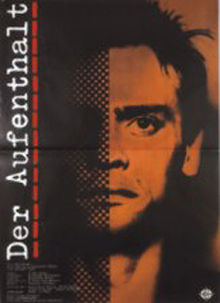
DER AUFENTHALT (THE TURNING POINT)
East Germany, 1983, 102 minutes, Colour.
Sylvester Groth, Fred Durer, Matthias Gunther.
Directed by Frank Beyer.
Der Aufenthalt (The Turning Point) is an excellent East German film. It is a true story, based on Hermann Kant's own experience when he was drafted into the German army towards the end of World War Two at the age of 19. The film shows a bewildered young man, accused wrongly, imprisoned by the Army, ridiculed, with pressure on him by fellow soldiers. The setting is Poland and highlights the animosity between Poland and Germany. The young man discovers the horrors of war as well as the concentration camps.
The acting is excellent, the pace and atmosphere very strong - one of the best portraits of a man in a prison situation.
1. The impact of the film? Emotional response? Intellectual response? Moral response?
2. An East German production? Colour photography, acting, editing? Authentic atmosphere?
3. The atmosphere of the '40s, an East German look back at World War Two and re-assessing it? The Polish point of view? The war, prisons?
4. The title and the focus on Mark Niebuhr? Following through his harrowing experience? Of the experience as a turning point in his life? Where he had arrived at at the end of the film?
5. The opening with the accusation, his experience, taken, registered, stripped, the cell? The audience not knowing the truth as well as Mark not knowing?
6. The audience sharing Mark's point of view - the unknown, what was on the outside, the puzzle of imprisonment?
7. The film as a picture of prison life and suffering: the cell, his standing, writing, the details of the daily life, standing to attention? The Polish attitude towards German prisoners? Food, being watched? The interrogations? Cell and the vegetable? His being with others - the S.S.? Work, the heights, food, the fall, arm in plaster? The girls - and Mark as a youngster? The Germans and their style, suspicion, treatment, friend and foe? Eric disowning? Comrades, drowning? Staying awake? The cumulative effect of this visualising of the prison experience?
8. The experience of an innocent sufferer? The impact of this kind of suffering on the audience - the feeling of helplessness, fear, dread? The realities of coping and trust?
9. The Polish experience of the war, Warsaw, Lublin, officers, interrogation, the warder and the fish, the heights, doctor and no word - no apology? The nature of justice?
10. The Germans in the group, the crimes, coping, rationalising, discipline, surviving, hostile, the hangings and executions?
11. The film as a view of war, a memorial of the war experience?
12. The issues of the human person: Mark as an ordinary citizen, the effect on his life? The importance of human dignity?
Published in Movie Reviews
Published in
Movie Reviews
Tagged under
Saturday, 18 September 2021 19:23
Waste Land
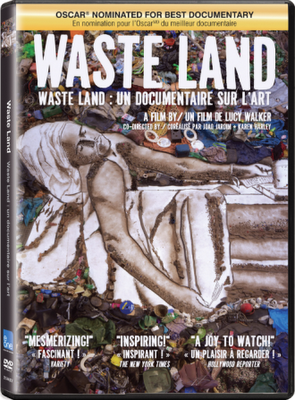
WASTE LAND
UK/Brazil, 2010, 99 minutes, Colour.
Vik Muniz.
Directed by Lucy Walker.
Anyone who has the opportunity to see Waste Land will be very happy that they did. It is a fine documentary, full of human interest, with a heart for people and justice, and a pleasing art lesson as well.
It is the work of Lucy Walker who has made a number of very good documentary films including Blindsight about Erik Weihenmayer and a group of blind climbers and guides on Mount Everest.
The subject of this film is photographer and artist, Vik Munoz, who moved from San Paolo, Brazil, to Brooklyn and achieved great success. He has the idea to go to Rio, to the landfill tip of Jardim Gramacho and make some works of art from the recyclable materials collected by the catadores, the many men, women and children who pick materials, collect them and sell them to recycling companies. He wanted to do something to help the people – he did not anticipate what would happen: so much good.
Vik Muniz is a genial character – we even visit his old house in Sao Paolo where his father is interviewed and he is filmed with his 93 year old grandmother. But, first of all he had to learn about the landfill, the people, their backgrounds and how they worked. As he gets to know them, chatting, moving around with his associate, Fabio (and all the while Lucy Walker photographs, keeping completely in the background), he picks out half a dozen or more who will be the subject of his art. He poses them like classic paintings, especially photographing Tiao, the founder of the pickers’ association and a born leader, like Marat in the bath in the picture by Jaques-Louis? David. T
The photos are highly enlarged on the floor of a warehouse and Vik engages his subjects to help in bringing them to life with the recyclables, outlining, giving colour as well as an idiosyncratically modern look. This has a profound effect on each of them, a man who collects books and who can talk about Nietzche, Tiao who also talks about reading Macchiavelli’s The Prince and what it meant to him, Valter who is getting old, Isis who has had a hard life, Suelem a young woman with two children, Magna who has been forced to work in the landfill when her husband lost his job, Irma, an elderly cook who keeps the caradores fed.
Vik and his wife have an important conversation about whether one of the subjects should go to London for the auction of the main painting. Is it too much and deflating when they have to go back to work? Or, is it an opportunity that will mean new choices? It is quite exhilarating for Tiao and the auction is a great success.
There is great joy at the end when they all go to the Museum of Modern Art in Rio and see themselves on the gallery walls. There is even greater joy when Vik gives them their picture and they hang it on the walls of their home.
The film offers a lot of think about it terms of work, poverty, exploitation (at one stage, the money to pay wages is stolen by thieves), human dignity, opportunities and self-esteem. This is confirmed in the final information given about each of them.
And the art is quite striking too. Even better when we watch how it was done.
1. The quality of the documentary? Information, entertainment, shared experiences, exhilaration and compassion?
2. The framework: the TV show, Vik as a celebrity, Tiao as a celebrity? The compere and his ignorance and Tiao correcting him? The TV and media world – a necessity, a difficulty? Where people get their impressions?
3. The New York story, Brooklyn, the house, the studio, Vik and his visit to San Paolo, his city? Rio, the range of the city, beauty, ugliness, the terrain, the statue, the ocean, the landfill?
4. Vik and his life, his art, photography, his success in America, the incident of his being shot? His new project, giving back something to the people? His hopes?
5. His partner in Rio, their working together, arranging the interviews at the landfill? Spending the two years? The detail of the technical work for the art?
6. The landfill, the Jardim Gramacho? The extent, the range of rubbish? The visit by Vik and his partner to study the landfill, giving the information to the audience, the catadores? The history of Rio, the police, the dangers, drugs? Work?
7. Vik and his wife, their discussion about the project, the later discussion about the effect of such success on the catadores and their lives?
8. Vik on site, the scope of his work, looking at the garbage, walking in it, the catadores, their bags, their masks? The recycling? Rubbish coming from all the range of homes in Rio? The recycling, the rest for landfill? The numbers of catadores, their shifts for work, picking out the recyclables, the trucks, taking away the material, the financial implications, the vastness?
9. The workers’ organisation, the group, Tiao as the founder, the opposition to him, his wariness, rather subdued? Yet Tiao as a leader, welcoming, the other members of the committee, the importance for money, amenities, the wages being stolen? The library? The continued expansion?
10. The selection of the subjects for the art, as persons, their stories, appearance, interactions, forming a group?
11. Isis, her life, hard, her female perspectives on life?
Magna, her husband being unemployed, her concealing her work at the landfill from others?
Suyen, her age, the two children, hard life, her being pregnant?
Irma, her work as a cook, her age, her experience, her liking being with the people?
Walter, old, his wise sayings, ‘Ninety-nine is not a hundred’?
Tiao, his life, his background, appearance, genial?
The librarian, his stories, his hopes to build up the library?
12. The photos themselves, modelled on classic art, Tiao and his being Marat assassinated in the bath? The women and the Mother Courage kinds of photos? Suyen as a Madonna-like mother with children? The enlarging of the photos, on the warehouse floor, adorning the photos, using the recyclables? The whole group involved?
13. The reaction to the enlarged photos, the types of recycling, the photo for the exhibition and auction?
14. The travel to the United Kingdom, Tiao and his being the representative, the background of the auction, the details of the auction, all those present, the bids, the money, the success of selling the picture? Tiao and his experience in London, phoning home?
15. The other subjects of the art, the interviews with the media in Rio? Going to the gallery, seeing their pictures on display, a sense of wonder, their being overcome? Vik giving them the pictures, hanging in their homes?
16. The information given about what happened to each of them, the growth in self-esteem? The possibilities for change of occupation, attitude to towards life because of the experience?
17. The film as an art lesson in itself – Tiao and his discussions about literature, Machiavelli, visual art, the need for understanding – and the audience understanding this art and appreciating it?
Published in Movie Reviews
Published in
Movie Reviews
Tagged under
Saturday, 18 September 2021 19:23
Immortals, The
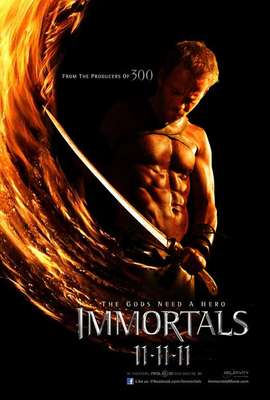
IMMORTALS
US, 2011, 110 minutes, Colour.
Henry Cavill, Mickey Rourke, Stephen Dorff, Freida Pinto, Luke Evans, John Hurt, Isabel Lucas, Kellan Lutz.
Directed by Tasim Singh.
I was going for the word ‘silly’ as a capsule comment when I came across a reviewer (who generally liked the film) who used the word ‘nuttiness’. He was right.
Does anybody really take the films about the doings of the Greek gods and their myths seriously – not that Immortals is really a serious take on the gods but here they are, Zeus, Athena, Poseidon – and find their goings on faintly credible? Clash of the Titans? Percy Jackson and the Lightning Thief? The forthcoming Wrath of the Titans? It is all pretty remote. We oldies may have studied some Greek and Ancient History so are on familiar enough ground. But, what do the multiplex audiences really think?
Anyway, here they are in a somewhat lurid and bloodthirsty tale that twists some of the legends of Theseus and the Minotaur, Hyperion, Zeus and the Titans. It is filmed in 3D, with atmospherically artificial sets, with ambiguous light and darkness (as with 300), a pounding score – and directed by Tarsem Singh who has some unusual credits, the Jennifer Lopez thriller, The Cell, and his history and culture bending, The Fall.
Mickey Rourke plays the villain (and quite sadistic in his range of tortures and executions), Hyperion, as if he were on leave from a bender in the Bronx. By contrast, John Hurt is full of dignity and gravitas as an old adviser to Theseus who is actually Zeus on earth (with Luke Evans taking up a more athletic, musclebound Zeus on Olympus). Actually, Henry Cavill is quite a musclebound Theseus, square-jawed and determined. Frieda Pinto is a virginal prophetess who sees the future and is anxious to be neither.
So, it is another humans-gods-titans clash which can be described as silly or nutty.
1. The audience for this kind of historical fantasy? Action features? Ancient history? Stories of the gods, the Titans and humans?
2. The production values: the lavish sets, the style of colour photography (muted, amber)? The special effects? The action sequences and computer graphics? The artificial style of the film? Its musical score?
3. The introduction with the quotation from Socrates? Giving the film some gravitas – before it loses it? The locations, the Greek coast, the sea, the cliffs, the villages? The contrast with the palaces and their interiors? The scenes on Mount Olympus – and the world of the gods? The Titans and their imprisonment?
4. The myths of Theseus and King Hyperion? From the ancients sources? The variations in the storytelling – adapted for the popular audience? How important was this – or not?
5. The situation of the gods, Zeus, Athena, Heracles? Poseidon? The scenes on Olympus, the clashes with the Titans and their imprisonment? The gods and their not to be seen by humans? Their not intervening in human affairs? But Zeus coming to Earth, disguised as an old man? His tutoring of Theseus? The later interventions, the gods having to fight, against Hyperion? The release of the Titans? The victory? The characterisations of the gods – Zeus as athletic hero? Athena and her relationship with her father? Poseidon and the sea?
6. Theseus, the background of his life, his mother, working? The authorities, slaves? The hard work? The atmosphere of revolution? Theseus as an adult, strong? His leadership qualities? Being trained by the old man – Zeus in disguise?
7. The old man, his dignity, his quotations, his helping Theseus, his being taken – and his going back to being Zeus?
8. The young men of the village, their working together? The traitor and his attack on Theseus? His being ousted from the kingdom? Going to King Hyperion? Hyperion and his brutality towards him? Making him his lieutenant, his power over him?
9. Stavros, the wisecracks, the slave? His attitude towards life, carefree? His teaming up with Theseus? His heroism, his presence in the fights?
10. The prophetess, the three women together? Their characters? Prophetic virgins? Hyperion wanting to find them, to get the information? Their being captured, the two being tortured, Phaedra and her escape? Her being rescued by Theseus? Suspicions? Her love for him? Their sexual encounter – and the birth of their child to be a later hero?
11. King Hyperion, Mickey Rourke’s presence and performance, particularly American? Power-hungry? His kingdom? His treatment of his slaves? His brutality?
12. The frequent scenes of torture, their graphic nature – fitting into the film? Excess?
13. The building up of the war situation? Theseus and his imprisonment, , leadership? People rallying round him?
14. The strategies, the battle sequences? Showy action?
15. The resolution of the problems? Peace on Earth? In the heavens? The credibility of this kind of story of gods in a rather more sceptical 21st century?
Published in Movie Reviews
Published in
Movie Reviews
Tagged under
Saturday, 18 September 2021 19:23
Sherlock Holmes: a Game of Shadows

SHERLOCK HOLMES: A GAME OF SHADOWS
UK, 2011, 129 minutes, Colour.
Robert Downey Jr, Jude Law, Noomi Rapace, Rachel Mc Adams, Jared Harris, Stephen Fry, Paul Anderson, Kelly Reilly, Geraldine James, Eddie Marsan.
Directed by Guy Ritchie.
When Guy Ritchie’s first Sherlock Holmes film was released in 2009, it seemed as if the screenplay and the new imagining of Holmes and his solving crimes was like a Graphic Novel. Holmes had become something of an action hero and quite a pugilist – bringing something of the 21st century into a 19th century society. If that was true then, it is even truer this time. Perhaps Sherlock had also had a premonition of Indiana Jones!
The first thing to do is include a warning. Purists beware – if the reaction of purists that I saw the film with is any indicator. They did not like this rather rambunctious Holmes – who seems to have studied some martial arts since the first film.
Be that as it may, the two films are what might be called ‘rollicking adventures’ and Robert Downey makes this kind of Holmes his own. There are the traits that Conan Doyle gave his creation, including his penchant for disguises. He is something of a snob, or considers himself superior – and he is not very considerate of others, including Dr Watson and his wife, Mary Morston. Jude Law has more to do in this one as Dr Watson and Kelly Reilly is not quite so-long suffering as she misses out on her honeymoon in Brighton as Dr Watson goes off to pursue Professor Moriarty with Holmes and save the world from World War I (or, rather, postpone it for twenty years). She gets involved in working for the authorities in London. Come to think of it, Holmes does a little channelling of James Bond, especially towards the end with an international peace conference in a castle on a high peak in the Swiss Alps that would have made Blofeld envious. There is a huge waterfall there as Holmes challenges Moriarty and Conan Doyle fans will know where the film and Holmes and Moriarty are heading.
Robert Downey, who showed twenty years earlier how he could do impeccable English when he portrayed Chaplin, is very Brit here, with wit, disguises, fighting and regrets for Irene Adler (Rachel Mc Adams who has a cameo here but featured in the original). There are several times when Guy Ritchie shows some flourishes as there are visual collages of Holmes’ mental and detection processes as well as the strategies of his fights with Moriarty, schematic outlines of what could happen and why.
Jared Harris (sounding more and more like his father, Richard, as he grows older) is Moriarty. His story and plots ares filled in extensively as are his dastardly plans to get France and Germany at war while he profits by munitions developments and sales. Stephen Fry appears more than before (and is seen more than before) as Mycroft Holmes.
The other member of the adventure is a gypsy whose brother has been taken in by Moriarty. ‘Have Dragon Tattoo, will have career.’ Noomi Rapace from the Millennium trio has been given an important role as the gypsy and gets plenty to do.
This is a bigger budget film than before and the sets are lavish, the action extended, and plenty of set pieces (and explosions) from London to Paris to Germany to Switzerland.
So, Holmes purists be alert. For everyone else, a visually stylish and busy, action-packed romp.
1. The popularity of Sherlock Holmes in every generation? A 21st century Sherlock Holmes? The characteristics from Conan Doyle – developed, eccentricities, sense of humour, disguises, detection, even vulnerability?
2. Robert Downey Jr as Holmes, his appearance, strong, his pugilism, his disguises, his wanting to be invisible with the furniture, a loner, his bond with Dr Watson, his relationship with Mrs Hudson and her reprimanding him? Watson, the impending marriage, his wanting to sabotage it? Mary Mawston? The expectations of this kind of Holmes? His relationship with his brother, the comparisons? Robert Downey’s accent and style?
3. London in the 1890s, the opening typewriting and publishing, the political background, arms races and development? Assassinations in Europe, the move towards World War One? Holmes and his intervening to stop the war? The details of London?
4. The locations beyond the United Kingdom, France, Paris, the opera, the meeting places and hotels? The French countryside? The border, the arms factory? Switzerland, the mountains, the castle, the waterfall? The musical score?
5. The camera styles, slow-motion, analyses of moves and strategies? The flash-editing? Pace?
6. The introduction, Irene Adler and her being followed, Holmes and his observations? The atmosphere of London? Irene and the past relationship with Holmes? Her working for Moriarty? The conversations with Irene, the attacks? The setup for the meeting, the restaurant, Moriarty and his presence, Irene’s death?
7. Holmes, his plans, the dinner, Irene’s death, Moriarty and the confrontation, the challenge? The issues? Moriarty, academic, professor, science, his discoveries and explanations? His lectures, book-signings, status in academic circles? His hunger for power, for wealth? His choosing the dark side?
8. Dr Watson, Jude Law’s style, his writing up Holmes’ stories? The visit, the plans for his marriage, the ceremony? Holmes attending? His reactions at the wedding? Interfering? His persuading Watson to come with him? Breaking the honeymoon in Brighton? The wedding, the crowds, the aftermath?
9. Not going to Brighton, travelling to Europe, Mary on the train, the clashes with Holmes, his throwing her overboard, her falling into the river, the rescue by Mycroft, her staying with Mycroft – and the irony of his naked encounter? Mary later working for the Foreign Office, her collaborating with Mycroft to defeat Moriarty?
10. Moriarty as a character, evil, listening to his lectures, his books, the audiences? Holmes parrying wit with him? His aims, interventions? In Paris? Science, the future, arms developments, sales, the building up of a war situation, the assassinations, the hotel in Paris? The opera Holmes and his detection work, with the gypsies, his mistake about the hotel?
11. The gypsy camp, Holmes and his encounter with Madam Simza? Her personality? The various gypsies, the camp, Holmes and their suspicions? His relating to Madam Simza, knowing about her brother? Going to Paris? The search for the brother, the underground cells, going to the lectures, his disguises, the bomb, the mistake?
12. The escape, going with Madam Simza, with Watson? The action sequences – in the James Bond style? The factory, the arms, the destruction – Moriarty’s henchmen? Colonel Moran? Bringing military skills?
13. The journey to Switzerland, the mountain settings, the castle, the waterfall? The atmosphere?
14. Mycroft, his character, working for the Foreign Office, with Sherlock, the delegates at the meeting, the dangers?
15. The social life in the castle, the interactions, the French, the Germans? The gypsies and their presence, the scapegoat for Moriarty?
16. The confrontation with Moriarty, the background of chess, outplaying each other, the physical fight, the visualising of the strategies for the audience? Seeing them played out? The plans of both Sherlock Holmes and Moriarty?
17. The final fight, the swashbuckling tone, both going over the waterfall – in the spirit of Conan Doyle?
18. The final disguise – and Holmes’ invention of merging into the background? Watson and his typing the story? Holmes adding the question mark?
19. A satisfying Sherlock Holmes story – but variations on Conan Doyle’s vision? Does this matter - the view of the purists? The view of the popular audiences?
Published in Movie Reviews
Published in
Movie Reviews
Tagged under
Saturday, 18 September 2021 19:23
Arrietty
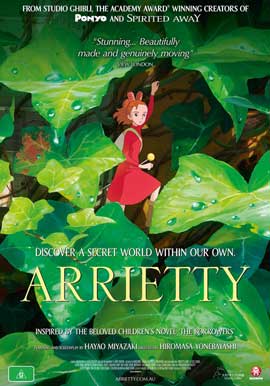
ARIETTY (KARI-GURASHI NO ARIETTI)
Japan, 2010, 94 minutes, Colour.
English version: Voices of Saoirse Ronan, Mark Strong, Tom Holland, Olivia Colman, Geraldine Mc Ewan, Phyllida Law.
Directed by Hiromasa Yonebayashi.
‘Charming’ is probably the most apt word to describe this Japanese animation film. It is probably the most useful as well. It is not a film for those who find charming uninteresting or distasteful.
Arietty is one of the little people, one of The Borrowers (from the novel by Mary Norton), a member of the Clock Family who live in the corners and spaces in an old house. They seem to be the lone survivors, not knowing any more Borrowers, and with a strict code not to be seen by humans. (There was a live action version of The Borrowers in the 1990s with John Goodman.)
When Arietty is out one day, Sho, a little boy who is resting at his grandmother’s before an operation, glimpses her. This creates confusion for the Borrowers, some upheaval in the house, especially from the ill-tempered maid who wants to call in exterminators.
While the idea might seem more than a little fey or twee, the charm carries it along. Arietty is no wallflower. She is very active, admired by her father, worried about by her mother – who is captured in a bottle by the maid and imprisoned in a cupboard which requires Arietty to use her brains and her skill to rescue her. In the meantime, the friendship between Arietty and Sho develops quite sweetly after initial suspicions.
This is Japanese animation. In the last decade, these animators have produced beautifully drawn films (rather than rely on computergraphics) including Oscar-winner, Spirited Away. Interestingly, they have taken on a number of British stories, Steam Boy, How’s Moving Castle. The director is Hiromasa Yonebayashi in his first film in this capacity. He worked as an animator on Spirited Away and Howl and was assistant to their director, Hayao Miyazaki, for Ponyo. His work is certainly in that tradition.
With all respect to American dubbing and the casts (Amy Poehler, Will Arnett and Carol Burnett), the version under review is the British dubbed version with such excellent actors like Saiorse Ronan as Arietty, Tom Holland as Sho, Mark Strong as her father, with Olivia Colman, Geraldine Mc Ewan and Phyllida Law.
As said before, charming.
1. The quality of Japanese animation? The animation for children’s audiences? Family friendly? The tales told, the characters, the beauty and charm of the films?
2. The story of the Borrowers, a British story, the adaptation for Japanese audiences?
3. The style of the drawings, their charm, the landscapes, characters, the action sequences? The score?
4. The quality of the British voices for the credibility of the story?
5. The simplicity of the story, the Borrowers and their life, their philosophy, borrowing from the humans, not being discovered, not to be seen by the humans? Their friendship, the encounter with the humans? Sho and Arietty? The sadness of the family having to leave at the end?
6. Arietty as the daughter Borrower, her relationship with her parents, her life, her bond with her father, the mother practical at home, the borrowing expedition, climbing, falling, her father helping her? Playing outside, her being seen by Sho? Meeting Sho, talking, learning about him, their activities together, the growing friendship, the help?
7. Sho, his age, with his grandmother, coming to the house, his settling in, his illness, the prospect of the operation? His seeing Arietty? Discovering her? Talking with her, the effect on him, the friendship? The maid and her antipathy? Helping the family to leave?
8. The maid, cranky, capturing the mother, putting her in the cupboard? Calling in the exterminators?
9. The grandmother, her concern for Sho, bringing him to the house, the operation, the delicacy of the situation?
10. Arietty, growing up, the expedition and its effect, the sugar, her father?
11. Her mother being captured, her mother and her screaming and fears? Arietty, the preparation for the rescue, the detail of the rescue, her achievement?
12. The family being the only Borrowers, the time to leave, the expedition away, their guide coming, farewell to Sho?
13. The future of the Borrowers and their survival, the effect on Sho and his experience with the Borrowers?
Published in Movie Reviews
Published in
Movie Reviews
Tagged under